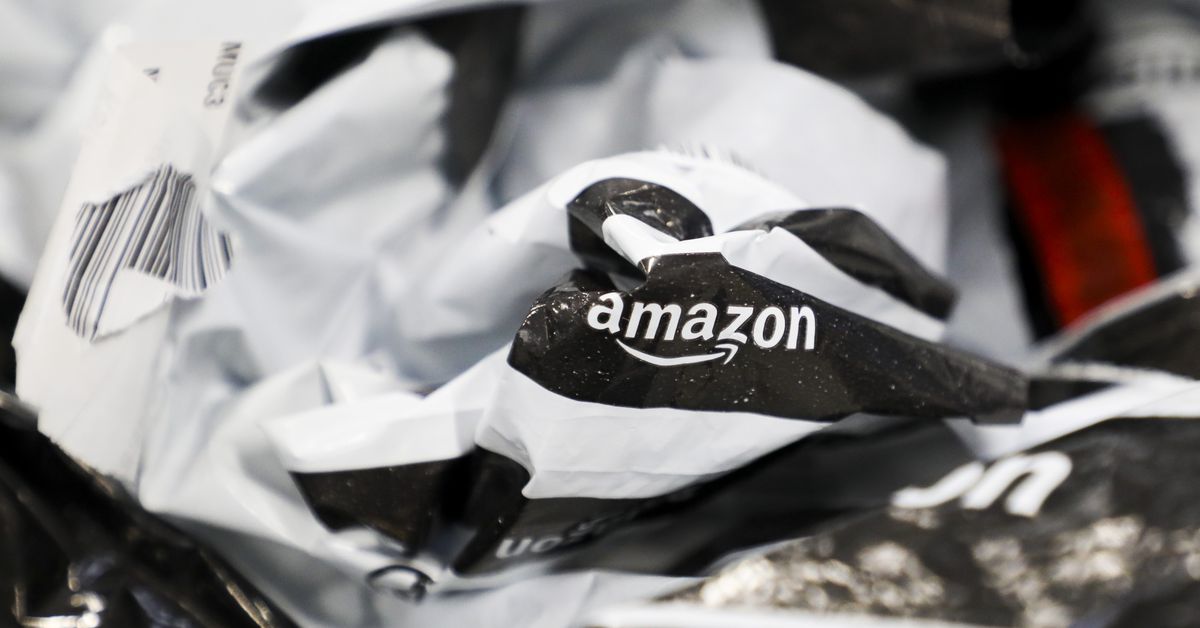Amazon generates millions of pounds of plastic waste
Source: The Verge added 15th Dec 2020Amazon’s plastic pollution is under scrutiny today with the publication of a new report by the nonprofit ocean advocacy organization Oceana. That report estimates that Amazon was responsible for 465 million pounds of plastic packaging waste last year. Amazon says that figure is overblown — by over 350 percent.
Amazon claims that it uses about a quarter of Oceana’s estimate, according to an email from the company to The Verge. If that’s the case, then Amazon still used more than 116 million pounds of plastic packaging in 2019. Amazon did not share what its total plastic footprint was either through a spokesperson or in its most recent sustainability report published last September.
Oceana still stands by the figures in its report, despite Amazon’s objections. “[Amazon] continues to, in response to questions about plastic use, offer anecdotes about packaging weight rather than transparency,” a spokesperson for the organization said in an email to The Verge. “Even the low number claimed by the company for its plastic packaging footprint would still be an enormous amount of plastic waste — enough to circle the earth over a hundred times in the form of air pillows and to cause very large problems for the oceans.”
The characteristic that makes plastic a sought-after packaging material for companies like Amazon happens to also make it a big problem for the world’s oceans — it’s easy to move because it’s so light-weight. That makes it a great material for Amazon’s air pillows. It also means that it only takes a ride down a storm drain or a strong gust of wind to push plastic debris into the sea. Once the plastic is at sea, it adds to floating mountains of garbage and frequently winds up in animals’ bellies. In 2019, a whale off the shores of the Philippines was found with 88 pounds of plastic in its stomach. And when humans eat fish that have ingested microplastics left over from our trash, that plastic can end up in our bellies, too.
Oceana is concerned that as more people shop online, a greater share of leftover packaging will end up in the ocean. Since Amazon hasn’t publicly released numbers on its plastic pollution, Oceana tried to track it down itself. “What you don’t measure you cannot manage. So we had to estimate this,” says Anne Schroeer, a director of strategic initiatives at Oceana. “Obviously, it would be much better if Amazon would publish their plastic footprint.”
Oceana used a roundabout way to try to figure out how much plastic waste Amazon creates — which is why there’s such a big discrepancy between its figures and how much plastic Amazon says it actually used. To reach its 465 million pound estimate, the nonprofit gathered data from packaging industry analysts on the amount of plastic packaging used around the world. They then assumed that Amazon’s share of that plastic waste matched its share of the e-commerce market.
Using that assumption, Oceana estimated that up to 22 million pounds of Amazon’s plastic packaging waste polluted freshwater and marine ecosystems across the world last year. It based that projection on a study published earlier this year that estimated that 11 percent of global plastic waste wound up in aquatic ecosystems. That study, however, isn’t limited to packaging waste, which makes it difficult to use its data as a way to pinpoint how much plastic pollution Amazon sent to oceans, rivers, and lakes.
“We share Oceana’s ambition to protect and restore the world’s oceans, and we support the reduced use of plastics. However, Oceana has dramatically miscalculated Amazon’s use of plastic,” a spokesperson for Amazon said in a statement.
Amazon has taken measures to cut down on how much trash comes from its packages such as sending items in their original packaging rather than boxing them up with more plastic and cardboard. The company says that it’s cut more than 900,000 tons of packaging material since 2015. It also developed a padded paper mailer in 2019 as a recyclable alternative to the plastic packaging the company uses.
Although bags and envelopes made out of plastic film can technically be recycled, in reality, a lot of it is probably tossed away. In most cities, curbside recycling programs don’t accept plastic film. Most Amazon customers would need to bring it to a nearby drop-off location that does accept that type of plastic. Oceana surveyed 600 Amazon Prime customers in the US in May, of which less than two percent of shoppers said they made the trek to drop off their used plastic packaging. Historically, only nine percent of the entire world’s plastic waste has ever been recycled, according to a 2017 study.
Oceana believes Amazon can do more to slash its packaging waste, and sees the changes it’s made in India as a good example. This June, Amazon India announced that it eliminated single-use plastics in its packaging at its fulfillment centers. The move followed India’s goal of phasing out single use plastics by 2022. Amazon also offers “packaging-free” delivery in more than 100 Indian cities — items are delivered in original packaging from the manufacturer and orders with multiple items are delivered in reusable totes.
Schroeer’s organization is pushing Amazon to bring reusable packaging to more places around the world. “[Amazon has] shown in India how fast they can really take action,” Schroeer says. “We are really confident that they can change quickly.”
brands: 11 Amazon Million New Rivers media: 'The Verge' keywords: Amazon Amazon Prime
Related posts
Notice: Undefined variable: all_related in /var/www/vhosts/rondea.com/httpdocs/wp-content/themes/rondea-2-0/single-article.php on line 88
Notice: Undefined variable: all_related in /var/www/vhosts/rondea.com/httpdocs/wp-content/themes/rondea-2-0/single-article.php on line 88
Related Products
Notice: Undefined variable: all_related in /var/www/vhosts/rondea.com/httpdocs/wp-content/themes/rondea-2-0/single-article.php on line 91
Warning: Invalid argument supplied for foreach() in /var/www/vhosts/rondea.com/httpdocs/wp-content/themes/rondea-2-0/single-article.php on line 91
